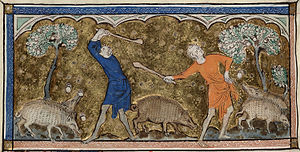Pannage


Pannageis the practice of releasinglivestock-pigsin aforest,so that they can feed on fallenacorns,beechmast,chestnutsor othernuts.Historically, it was a right or privilege granted to local people oncommon landor inroyal forestsacross much ofEurope.[1]The practice was historically referred to asEichelmastorEckerichinGerman-speaking Europewhile the fee to feed one's livestock in such a way was historically referred to asžirovinain Croatia and Slovenia.
Pannage had two useful purposes in theMiddle Ages.Whilerootingaround looking for nuts, pigs also turned the soil and broke it. Pig-rooting prevented soil compaction and released nutrients for plant growth. It also fattened pigs for slaughter.
Especially in the eastern shires of England, pannage was so prominent a value in the economic importance of woodland that it was often employed, as inDomesday Book(1086), as a measurement. Customarily, a pig was given to thelord of the manorfor every certain number of pigs loosedde herbagio,as the right of pannage was entered.[1]Edward Hastedquotes the Domesday Survey details forNortonin Kent. "Wood for the pannage of forty hogs".[2]
Pannage is no longer carried out in most areas, but is still observed in theNew ForestofSouthern England,where it is also known ascommon of mast.It is still an important part of the forestecology,and helps the husbandry of the other New Forestlivestock– pigs can safely eat acorns as a large part of their diet, whereas excessive amounts may bepoisonoustoponiesandcattle.
The minimum duration of the New Forest pannage season is 60 days,[3]but the start date varies according to the weather – and when the acorns fall. TheCourt of Verderersdecides when pannage will start each year. During other times, pigs are not allowed to roam the forest, with the exception that breeding sows (known as "privileged sows" ) are by custom allowed out, providing that they return to the owner's holding at night and are not a nuisance. The pigs each have severalnose ringsclipped into their noses to prevent themrootingtoo much and causing damage to grassland.
References
[edit]- ^abH. R. Loyn,Anglo-Saxon England and the Norman Conquest,2nd ed. 1991:369.
- ^Hasted, Edward (1798)."Parishes".The History and Topographical Survey of the County of Kent.6.Institute of Historical Research: 401–413.Retrieved6 March2014.
- ^Cooper, Graham."The New Forest today: Common Rights".The New Forest.www.newforest.hampshire.org.uk. Archived fromthe originalon 13 October 2007.Retrieved26 July2010.
Further reading
[edit]- Kreiner, Jamie (2020).Legions of Pigs in the Early Medieval West.New Haven, Conn.: Yale University Press. pp. 108–119.doi:10.2307/j.ctv177tk45.ISBN9780300246292.JSTORj.ctv177tk45.

